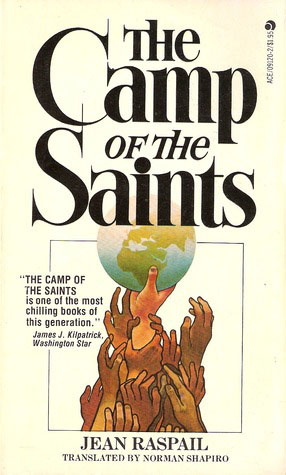Modern Critics Have Justified the Message of a 1973 Novel on Mass Immigration
KC McAlpin, The Hill, May 29, 2017
Since Donald Trump’s election as president, an obscure 1973 novel by French author Jean Raspail, “The Camp of the Saints,” has received more media attention, often bordering on the hysterical, than at any time since it was published over four decades ago. Why would an aging work of fiction attract such a sudden burst of interest?

For one thing, the book imagines a massive invasion of Western Europe by Third World immigrants that almost exactly predicted the massive wave of Middle Eastern and African refugees and economic migrants that swarmed into Europe over the past two years. That theme, and the fact that the mass migration amplified the popularity of Donald Trump’s tough stance on illegal immigration during the campaign, is enough to give leftist elites a case of the vapors.
Adding to their fury, populist leaders in Europe and the U.S. have praised the book. When the Syrian Refugee crisis began, Marine Le Pen said, “I invited the French to read, or read again ‘The Camp of the Saints,’ by Jean Raspail, because the images of cargo ships throwing hundreds of migrants — that’s The Camp of the Saints.” And liberal lightening rod and Trump advisor Steve Bannon has repeatedly cited the book, describing an “almost Camp of the Saints-type invasion into Central and then Western and Northern Europe.”
{snip}
The book has recently been described as “really racist” (The Week), “staggeringly racist” (Slate), “unbelievably racist” (Bustle), “violently racist” (Politico) and “rabidly racist” (Huffington Post).
{snip}
“The Camp of the Saints” is not racist, but Raspail mocked those who believed that racism “practiced by whites — heinous and inexcusable, whatever its motives — and that practiced by blacks — quite justified, whatever its excesses” should be able to morally blackmail Europeans to replace its historic population. In the years since its publication, academics have repeatedly redefined racism and come up with concepts like “white privilege” and “intersectionality” to justify this double standard.
{snip}
Raspail identified journalists as among the worst perpetrators of this suicidal ethos. He wrote how through “constant bludgeoning by the press … the notion of self-defense … was nipped in the bud.” By responding to legitimate concerns about mass immigration that Raspail raised in his book with monotonous and uninformed smears, critics of “The Camp of the Saints” simply show that history is proving him right.















